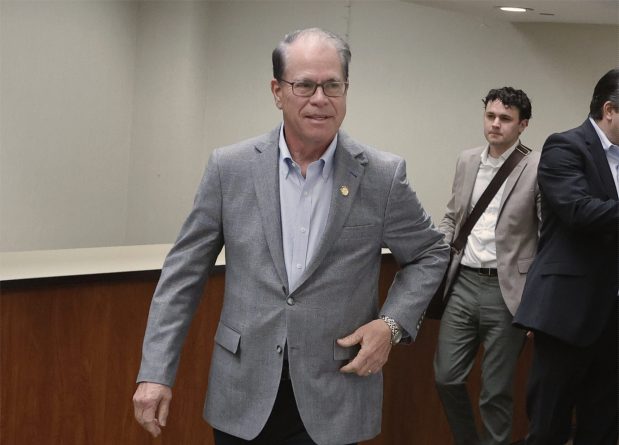Gov. Mike Braun signed the partisan school board bill, which passed out of the Senate for the final time by one vote, into law Tuesday.
Senate bill 287, which will require school board candidates to declare a political party when running in a general election, passed 26-24 on April 24, which was the final day of session.
Bill author Sen. Gary Byrne, R-Byrneville, said in a statement Wednesday that he authored the bill because “voters should know where candidates for office stand on the issues” of stewarding taxpayer dollars and setting educational policies.
“While the initial version of the bill included a provision for a primary process to ensure that vote-splitting did not lead to voters being effectively disenfranchised in a general election, I was thankful to see the governor sign the bill into law because it is an important step forward in increasing transparency for voters while ensuring running for local office remains accessible for Hoosiers,” Byrne said in the statement.
During the Senate’s final discussion of the bill, Byrne said school boards should be partisan because school board races see lower voter turnout because voters don’t know the political party of the candidates. Further, school boards are already partisan, Byrne said.
“Like it or not, this is something that voters want to know about the candidate,” Byrne said. “Some people who are against this bill say school boards shouldn’t be partisan. I don’t think this bill makes them partisan, I think that they already are partisan.”
Senate Bill 287 was amended in the House Elections and Apportionment committee to reflect House Bill 1230, authored by Rep. J.D. Prescott, R-Union City, which removed the primary election requirement and states that in the general election a school board candidate can choose to be listed as a Republican, Democrat, independent or nonpartisan.
When the bill was heard by the House, it was amended further to state that if a candidate chooses to be nonpartisan, then a blank space will appear on the ballot where party affiliation would be listed.
If the board member who leaves the board was a Republican or Democrat, then a caucus should be held to replace that member, but independent or nonpartisan candidates can be replaced by the sitting school board members, according to the bill.
Under the bill, board members would see a pay increase from $2,000 to 10% of the lowest starting salary of a teacher working in the district.
Initially, the Senate filed a motion to dissent from the House amendments to the bill, but the dissent was rescinded two days before the end of session and a concurrence was filed. That allowed the bill, as amended by the House, to advance for final consideration by the Senate.
A concern with the bill, Byrne said, has been that it would trigger the Hatch Act, a federal law that prevents federal employees from running in a partisan election. But, Byrne said the Hatch Act already impacts school board candidates because once a candidate includes political language on campaign literature or is endorsed by a political party then the race becomes partisan.
Further, Byrne said the House amendment allows for nonpartisan candidates to be placed on the ballot. Byrne suggested that it could help federal employees running in a school board race.
According to the Hatch Act, even if a federal employee ran as a nonpartisan candidate, if other candidates declare a party then the race becomes partisan and the federal employee couldn’t run.
Mark Sperling, Indiana University Northwest interim dean of the School of Education, said he was “very disappointed” that the partisan school board bill has become law.
“I don’t think school boards should be partisan. School boards represent an entire community not sections of a community,” Sperling said.
Sperling, who previously worked in the K-12 education systems in Indiana and Michigan, said education shouldn’t be political, and it’s “unfortunate” that school boards will now become political.
Under the new law, Sperling said it’s likely that qualified candidates won’t run for school board because they won’t want to enter a political race. It’s his hope, Sperling said, that the majority of school board candidates run as independents to keep politics out of the school board.
“To have a political party attached to you, I think adds pressure, adds a different level of responsibility than it would if you were a nonpartisan school board member whose only concern is the welfare of the children in the school corporation,” Sperling said.
Rep. Vernon Smith, D-Gary, who has spent decades as an educator, said making school board races partisan will be “detrimental to the public school system.”
The goal of the law is for public schools to become more like the Republican party, which includes banning books and diversity, equity and inclusion initiatives as well as micromanaging educators, Smith said.
“They are trying to get their beliefs imposed on public schools,” Smith said. “The focus ought to be on excellence in education.”
GlenEva Dunham, president of the Gary Teachers Union, Local 4 and president of American Federation of Teachers Indiana, said school boards should be focused on the students, not politics.
“Even though they declare what party they are for, we hope that they continue to listen to the community, to listen to the parents whose children are in those districts and do what is best for the children,” Dunham said.
akukulka@post-trib.com



